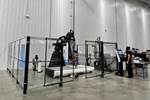CEAD print bed anchors ensure first layer adhesion in large-format 3D prints
Reusable plugs insert into CEAD’s patent-pending print bed, enable locking of first layer and easy release once printing is finished.
CEAD’s reusable plastic print bed plugs (blue) channel extruded material to create anchors ensuring first layer stability. Source (All Images) | CEAD
CEAD (Delft, Netherlands) provides a range of for composites additive manufacturing (AM), including pellet extruders, gantry- and robot-based printing systems, rotary tables, robot rails and now, innovative print bed and anchoring solutions.
CEAD’s patent-pending print bed platform consists of an aluminum base, which can feature an aluminum plate mounted on top of the frame and heated up to 120°C for materials that require a more gradual cooling process.
The print bed has a modular build. This enables the standard 2 × 1-m platforms to be joined to create a larger print bed. This enables companies to start with a smaller system and then easily expand over time.
CEAD aluminum print bed platform.
This system also uses print bed plugs — reusable plastic anchors that serve to channel extruded print material from the first layer to create a mechanical bond with the aluminum print bed platform. Thus, each print is securely fastened using consistent hooks made from the printing material itself. These reusable plastic plugs enable optimal stability and reliability from the print’s start to finish — and despite their firm grip, completed parts are reported to release effortlessly post-print.
“First-time-right adhesion is guaranteed with this table and plug system for reliable production and seamless 3D printing at scale,” says Maarten Logtenberg, CEAD co-founder and CTO.
Related Content
-
Welding is not bonding
Discussion of the issues in our understanding of thermoplastic composite welded structures and certification of the latest materials and welding technologies for future airframes.
-
Plant tour: Daher Shap’in TechCenter and composites production plant, Saint-Aignan-de-Grandlieu, France
Co-located R&D and production advance OOA thermosets, thermoplastics, welding, recycling and digital technologies for faster processing and certification of lighter, more sustainable composites.
-
JEC World 2024 highlights: Thermoplastic composites, CMC and novel processes
CW senior technical editor Ginger Gardiner discusses some of the developments and demonstrators shown at the industry’s largest composites exhibition and conference.






